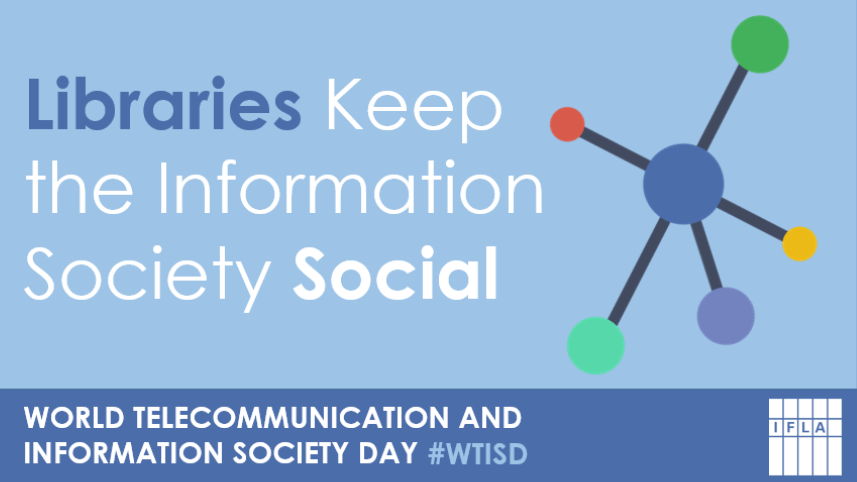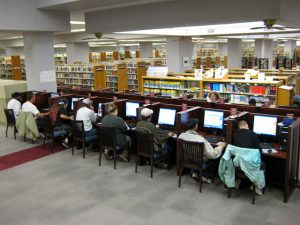
17 May is World Telecommunication and Information Society Day, marking the anniversary of the signing of the first International Telegraph Convention in 1865. Communications have clearly changed a lot since then, and in doing so have changed economics and societies.
As in any situation of rapid and radical change, it challenges us to find ways to defend values and principles that are timeless, in new circumstances. To consider not just economic questions, but also social ones that go beyond making money, and focus on how we can best live together.
In short, the information society must be truly social, and libraries can help make this happen.
Access for all
A first key principle of a healthy society has to be inclusion. In the case of the information society, this means that everyone should have the possibility to access the possibilities created by information technologies to improve their own lives. 2018 is the year that we are likely to see 50% of the world’s population connected.
However, while growing wealth and the falling cost of connectivity is helping boost access, it should not be economics alone that determines who can go online. Indeed, such an approach will tend to bring greater benefits to those who were already better placed.
Public Internet access in libraries – a priority set down in the original WSIS agenda in 2005 and reaffirmed in 2015 – has a major role to play both in bringing people online, and as a complement to ‘private’ access at home. Libraries around the world are offering both connection, and the necessary devices, to allow people to start to benefit from the Internet.

Fort Worth Computer Lab. CC-BY 3.0 Informationwave https://bit.ly/2InHtwE
Meaningful access for all
For many, simply getting online is all that’s necessary. We know that when users are motivated, they can often learn how to use technology themselves. However, this will not be the case for everyone, including those who may not see the value in access, or who can be discouraged by frustrations or failures. There is a real value in intermediaries – in particular libraries – who can offer the guidance, support and simply encouragement needed to create confident and knowledgeable users.
It is worth highlighting yesterday’s decision in the US Senate to overturn the Federal Communications Commission’s efforts to end net neutrality. The move increases the chances of ensuring that all websites can benefit from the same access speeds as each other, instead of giving preference to those who can strike deals with Internet service providers. This is a good result for libraries, who have been arguing in favour of this for a number of years.
Defending social principles
Beyond access, there are also more complex questions around behaviours and attitudes online. There is a recurring fear that the Internet is undermining many of the rules – written and unwritten – that help people live together. It is true that in facilitating greater freedom of expression and access to information, new technologies have also facilitated crime and attacks on human rights.
A smarter approach is needed than simply cracking down on the Internet, or the services that make it work. Fears about motor transport at the beginning led to very low speed limits and tough regulation, but it was soon accepted that education (i.e. driving lessons) was the best way forwards, with punishment for genuine offenders. The Information Society should work in the same way.
Libraries argue for the defence of key principles – the right to privacy should be observed, that free speech should not be unduly curtailed (and that education is the only sustainable response), and that information users have rights, as set down in exceptions and limitations to copyright – that should be respected. Through their own activities they can set examples, educate users (the subject of a side-event held today at RightsCon, in Toronto, Canada), and advocate for better laws.
As Vint Cerf underlined last year, the principles that underpinned the development of libraries are sorely needed in the further development of the Internet. The Internet Society must be social.
Find out more about IFLA’s work on the information society.